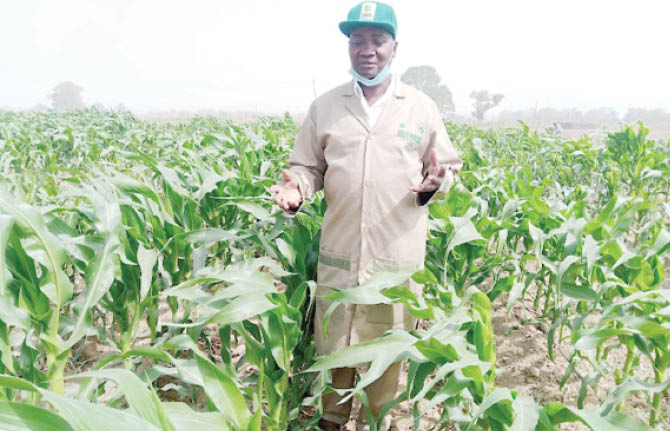Scientists evaluating TELA Maize national performance trial hail prospects
The Institute for Agricultural Research (IAR) has said that the TELA maize variety currently undergoing National Performance Trial in Nigeria is a high impact yielding variety that Nigeria needs to overcome its national maize deficiency. Executive Director IAR, Prof. Mohammad Ishiyaku, said at the TELA Maize Seeing-Is-Believing/Field Day at the Institute for Agricultural Research Station […]

Prof Rabiu Adamu, the lead investigator, TELA Maize
The Institute for Agricultural Research (IAR) has said that the TELA maize variety currently undergoing National Performance Trial in Nigeria is a high impact yielding variety that Nigeria needs to overcome its national maize deficiency.
Executive Director IAR, Prof. Mohammad Ishiyaku, said at the TELA Maize Seeing-Is-Believing/Field Day at the Institute for Agricultural Research Station Minjibir, Kano State, that TELA maize is a “potential high impact variety that should come into economic circulation in Nigeria’s agriculture system as soon as possible.”
- INEC queries 2 staff over extortion of registrants in Benue
- Fish demand surpasses 3.6m tonnes as many farms shut
“The savings farmers will make from this maize variety is estimated to be over N3 billion from insecticide spray of 500 hectares land and over 6billion naira from drought effects. This is to ensure that we continue to expand government resources strictly on solving those problems that will lead to national economic growth and self-sufficiency in food production.”
“This variety has a lot of benefits for Nigerians and more importantly, it will assist in meeting the national maize demand deficit which currently stands at 6 million metric tonnes,” he added.
Earlier, Prof. Rabiu Adamu, Principal Investigator of TELA Maize Nigeria, said that the trial started in Nigeria in 2019 with a view to mitigating the challenges of fall armyworm and stemborers as well as drought capable of reducing farmers’ yield by 80 percent if not appropriately managed.
He said with the TELA Maize, farmers will reduce the use of pesticides on maize to the barest minimum thus ensuring a safer environment and healthy populace.
“Nigeria produces only about 12 million metric tonnes of Maize below the 18million metric tonnes required with a deficit of 6million metric tonnes. Also, the current yield per hectare of maize stands at 2.5 to 3 tonnes which is grossly inadequate for a population of over 200 million people. TELA Maize when released to farmers will therefore bridge this gap by increasing their average yield to 8 tonnes per hectare,” he said.
TELA maize is a genetically modified variety engineered to resist fall armyworm, stern borer, and mild drought. The variety was developed by the Institute for Agricultural Research (IAR) under an international collaboration coordinated by the Africa Agricultural Technology Foundation (AATF).
The TELA Maize Project is a public-private partnership led by the African Agricultural Technology Foundation (AATF) in seven African countries Kenya, Uganda, Tanzania, Ethiopia, Mozambique, Nigeria, and South Africa.
